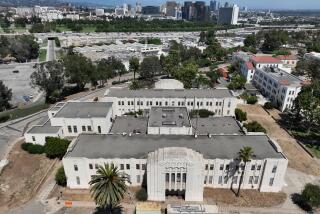South L.A. fears loss of St. Francis trauma hospital
For Eleanor Taylor, St. Francis Medical Center has meant the difference between living and dying.
Doctors at the Lynwood hospital treated the 84-year-old when she had a stroke and underwent gallbladder surgery. Earlier this year, surgeons there saved her grandson after gunmen pumped 10 bullets into him.
“With us living so close … that is the reason why he is alive today,” the Watts resident said, her voice cracking and her eyes rimming with tears. “I really do believe that.”
Before St. Francis, the South Los Angeles area — which has a disproportionate number of victims of traumatic injury and violence — was served by Martin Luther King Jr./Drew Medical Center. That facility closed in 2007 in the wake of medical errors that caused patient deaths.
Now St. Francis is in financial trouble, leaving residents worried that they will lose their trauma center — again.
The Daughters of Charity Health System, which operates the hospital along with five other nonprofits, has been losing money and is up for sale. St. Francis lost $16 million in the year ending June 2014, according to state filings. California Atty. Gen. Kamala D. Harris has mandated that any buyer must maintain the same level of care for a decade, which would mean preserving the trauma center. That requirement already has led one purchase to fall through.
In the 1980s, Los Angeles County had 22 trauma centers, strategically spread out so that care was available to patients in the critical minutes after a shooting, car accident or other incident. That network has been reduced, mostly by lack of funding, to 14 hospitals that serve about 25,000 patients a year.
St. Francis is the busiest among them. The 384-bed hospital sees more than 2,100 trauma patients a year. One in four rushed into the center has life-threatening gunshot or stab wounds.
In an effort to pressure elected officials to guarantee that trauma services will remain available, community activists have been protesting outside a slimmed-down, 131-bed Martin Luther King Jr. Community Hospital that is scheduled to open in June.
“We need a trauma center,” said Gerald Riley, 52, of Willowbrook. “With the gang activity and violence in this neighborhood, by the time they take them to St. Francis or Gardena, they have lost their battle with life.”
A feasibility study, commissioned by the county Board of Supervisors, outlined the hurdles Martin Luther King would face if it sought certification as a designated trauma center. More patient beds would be needed, possibly even additional operating rooms. A helipad would have to be built and specialized surgeons would have to be hired and trained,.
A price tag has not been calculated, but it probably would run into the tens of millions, officials said. Even if the funds were available, the earliest Martin Luther King could receive certification is “late 2018 or early 2019,” according to the report.
Supervisor Mark Ridley-Thomas, who represents the area surrounding Martin Luther King, is seeking backup plans. In a letter to the head of Daughters of Charity, he asked that the chain sell St. Francis separately “to preserve critical health services” in the region.
“Should St. Francis, God forbid, not end up with a new buyer and/or operator, it puts a considerable amount of pressure on MLK Community Hospital,” Ridley-Thomas said.
If St. Francis were to close or eliminate its trauma services, said Cathy Chidester, director of the county’s Emergency Medical Service Agency, the system would adjust as it did when Martin Luther King Jr./Drew Medical Center closed. Boundaries would be redrawn and patients distributed to Long Beach Memorial, Harbor-UCLA or the County-USC Medical Center on the city’s Eastside.
That might increase the time it takes to get some trauma patients to hospitals, Chidester said, but those in South Los Angeles still would arrive within the half-hour drive time the county requires.
At a recent meeting at a Compton community center, residents expressed concern over potentially long travel times and the current lengthy waits at St. Francis and other nearby hospitals. Compton Fire Chief Jon Thompson said that paramedics sometimes have to take patients to Torrance or San Pedro when St. Francis is overburdened.
“If you ain’t dead by the time you get down there, you will be when you see the transportation bill,” said Mac Shorty of the Watts Neighborhood Council. “The community cannot thrive without the essentials.”
Twitter: @AngelJennings
More to Read
Sign up for Essential California
The most important California stories and recommendations in your inbox every morning.
You may occasionally receive promotional content from the Los Angeles Times.











